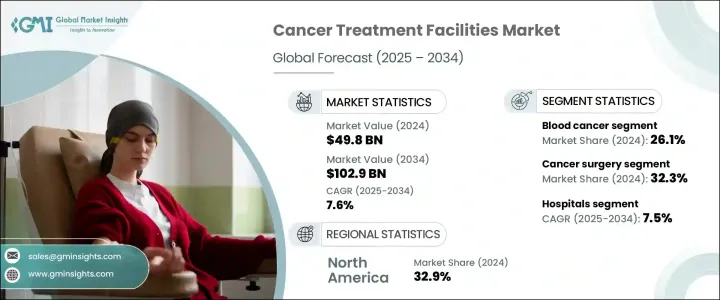
세계의 암 치료 시설 시장은 2024년에 498억 달러로 평가되었고, CAGR 7.6%로 성장해 2034년에는 1,029억 달러에 이를 것으로 추정되고 있습니다.
암 치료 센터는 다양한 유형의 암의 진단, 치료 및 지속적인 관리에 중점을 둔 전문 의료 기관입니다. 이 치료 센터는 일반적으로 화학 요법, 방사선 요법, 면역 요법, 외과 치료, 사후 관리 등의 서비스를 제공합니다.

세계의 암 이환율 상승이, 이 시장의 주된 촉진요인입니다. 인구의 고령화는 암의 진단 건수 증가에 크게 기여하고 있어, 그 결과, 전문적인 암 치료에 대한 수요가 높아지고 있습니다. 이러한 기술 혁신은 특히 암에 걸리기 쉬운 고령자층 증가에 대응하는 것을 목적으로 하고 있습니다. 또한, 의료 관광은 암 치료 시장의 확대에 기여하고 있어 특히 저렴한 가격의 치료 옵션이, 저비용으로 질 높은 치료를 요구하는 외국인 환자를 끌어들이고 있는 지역에서 암 치료 시장의 확장에 기여하고 있습니다.
| 시장 범위 | |
|---|---|
| 시작 연도 | 2024년 |
| 예측 연도 | 2025-2034년 |
| 시작 금액 | 498억 달러 |
| 예측 금액 | 1,029억 달러 |
| CAGR | 7.6% |
혈액암 분야는 2024년에 26.1%의 최대 점유율을 차지했습니다. 이 성장의 원동력은 지속적인 임상 수요와 전문 치료 시설을 포함한 혈액암 치료에 필요한 광범위한 인프라입니다. 중형 치료 프로토콜이 시장 확대에 크게 기여하고 있습니다. 또한 장기간의 경과 관찰, 집학 의료 팀의 참여, 고급 진단 능력의 필요성 등이 다른 암종에 특화된 치료 센터보다 이러한 전문 치료 센터의 중요성을 더욱 강조하고 있습니다.
2024년에는 병원 부문이 67.5%의 점유율을 차지했고 최대 시장 점유율을 차지하며 앞으로도 CAGR 7.5%로 성장할 것으로 예측됩니다. 병원에서 암 치료 시설에 대한 수요는 고급 감지 도구의 가용성과 화학 요법, 방사선 요법 및 호르몬 요법을 포함한 광범위한 치료 옵션에 의해 견인되고 있습니다.
미국의 암 치료 시장은 2024년에 149억 달러로 평가되어 고령화와 암 환자 증가에 의해 지속적인 성장이 예상되고 있습니다. 이로 인해 로봇 수술, 면역 요법, 정밀 의학과 같은 최첨단 치료를 제공하는 통합 암 센터가 개발되었습니다. HCA 헬스케어 등 업계의 대기업은 파트너십을 맺고 AI 기술을 도입함으로써 그 세력을 확대하고 있습니다.
세계 암 치료 시설 시장의 주요 기업은 Alliance HealthCare Services, American Oncology Institute, Apollo Hospitals Enterprise, Cancer Treatment Centers of America, Compass Oncology, Curie Oncology, Fortis Healthcare, GenesisCare, HCA Healthcare, Health Hrudayalaya, OncoLife Hospitals, Ramsay Health Care, Tenet Healthcare 등이 있습니다. 시장 포지션을 강화하기 위해 암 치료 시설 부문의 기업은 AI, 로봇 수술, 정밀의료 등 첨단 기술의 통합에 주력하고 있습니다. 또한 다른 의료 제공자 및 조직과의 전략적 제휴를 통해 서비스를 확대하고 있습니다. 가치 기반 케어 모델의 채택이 진행됨에 따라 비용을 절감하면서 환자 결과를 개선할 수 있습니다. 많은 조직들이 진단부터 치료 후 케어까지 종합적인 서비스를 제공하는 통합암 의료 센터를 건설하고 있습니다.
The Global Cancer Treatment Facilities Market was valued at USD 49.8 billion in 2024 and is estimated to grow at a CAGR of 7.6% to reach USD 102.9 billion by 2034. Cancer treatment centers are specialized healthcare institutions focused on the diagnosis, treatment, and ongoing management of various cancer types. These centers typically offer services such as chemotherapy, radiation therapy, immunotherapy, surgical treatments, and aftercare. They employ multidisciplinary teams of professionals, including oncologists, surgeons, radiologists, and nursing staff, to ensure tailored care for each patient.

The rising global prevalence of cancer is the main driver for this market. Aging populations significantly contribute to the growing number of cancer diagnoses, which in turn is increasing the demand for specialized cancer care. To meet these needs, treatment facilities are enhancing their infrastructure and adopting advanced technologies, such as precision oncology and multidisciplinary treatment models. These innovations aim to cater to the growing elderly demographic, which is particularly vulnerable to cancer. Additionally, medical tourism is contributing to the expansion of the cancer treatment market, particularly in regions where affordable treatment options attract international patients seeking high-quality care at lower costs.
| Market Scope | |
|---|---|
| Start Year | 2024 |
| Forecast Year | 2025-2034 |
| Start Value | $49.8 Billion |
| Forecast Value | $102.9 Billion |
| CAGR | 7.6% |
The blood cancer segment held the largest share of 26.1% in 2024. This growth is driven by the ongoing clinical demand and the extensive infrastructure required to treat hematological cancers, including specialized treatment facilities. Moreover, the complex, costly, and often intensive treatment protocols, which involve chemotherapy, bone marrow transplants, and immunotherapy, are major contributors to the market's expansion. Moreover, the requirement for long-term follow-up care, the involvement of multidisciplinary medical teams, and the need for advanced diagnostic capabilities further emphasize the importance of these specialized treatment centers over those focused on other cancer types.
In 2024, the hospitals segment held the largest market share, accounting for 67.5% share, and is expected to continue growing at a CAGR of 7.5%. The demand for cancer treatment facilities in hospitals is driven by the availability of advanced detection tools and a wide range of treatment options, including chemotherapy, radiation, and hormone therapy. Patients prefer hospitals for their comprehensive services and access to multidisciplinary care teams.
U.S. Cancer Treatment Market was valued at USD 14.9 billion in 2024 and is expected to see continued growth due to an aging population and an increase in cancer cases. This has led to the development of integrated cancer centers that provide cutting-edge treatments like robotic surgery, immunotherapy, and precision medicine. Major industry players, such as HCA Healthcare, are expanding their reach through partnerships and incorporating AI technologies. Government initiatives and value-based care models further drive market growth.
Key players in the Global Cancer Treatment Facilities Market include Alliance HealthCare Services, American Oncology Institute, Apollo Hospitals Enterprise, Cancer Treatment Centers of America, Compass Oncology, Curie Oncology, Fortis Healthcare, GenesisCare, HCA Healthcare, Healthcare Global Enterprises, IHH Healthcare Berhad, Narayana Hrudayalaya, OncoLife Hospitals, Ramsay Health Care, Tenet Healthcare. To strengthen their market position, companies in the cancer treatment facilities sector are focusing on the integration of advanced technologies such as AI, robotic surgery, and precision medicine. They are also expanding their services through strategic partnerships with other healthcare providers and organizations. The increasing adoption of value-based care models helps improve patient outcomes while reducing costs. Many organizations are building integrated cancer care centers to offer comprehensive services, from diagnosis to post-treatment care.